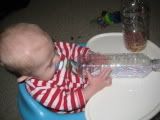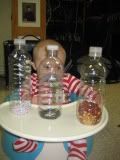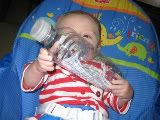When I became pregnant with Jonah, I became obsessed with something that most women give very little thought to. How I would feed my baby. I read countless books about how the breast produces milk, went to breastfeeding classes, learned about the politics and economy of formula feeding, and the vast differences between formula and breastmilk. I vowed when I was 20 weeks pregnant, and my colostrum came, that I would never feed my children formula. There was no questioning. I was on my soapbox, and I wouldn't come down.
Over and over, I would tout the importance of breastfeeding to anyone who would listen. I would banter for hours about how manufacturers make formula out to be just as good or sometimes better than mothers milk, when truth be told it is a pale imitation of something that cannot be synthesized. I was very proud to be a so-called "lactivist."
When Jonah was born, the nurses gave him formula without my permission. As I held him for the first time, and he latched on like a pro, I whispered into his little ear not to worry, that was the last time he'd be getting that "crap." He was getting la creme della creme from now on. I kept it a little known secret that he'd ever had that little ounce of formula, and blazoned my "exclusively breastfeeding" title wherever I could. Breastfeeding became more than a way of nurturing my child, it became a way of life for us as we drove through snowstorms to La Leche League meetings, and stood up to anyone daring to ask us to "move to a private location" when feeding out in public. Even on this blog, two posts ago, I set my soapbox down and furiously wrote about the importance of breastfeeding in public. I wanted to nurse Jonah until he self-weaned. Whether that was at two years or five years, I was commited to giving my son that security.
Recently, as you may have read, I was body checked off of my soapbox. Completely devestated as doctors told me to stop nursing, I began mixing bottles of pumped milk and formula for my severely underweight son. It was only going to be temporary, and even though my milk supply had dropped drastically from Jonah only eating two ounces at each feeding, I was determined to get my body to produce milk and get Jonah back to breast and off formula as quickly as possible.
We rented a hospital grade pump; I began taking several herbal supplements; all soda and juice in my diet was replaced with water and high electrolyte drinks. I pumped every hour. Within a week, I saw results. I was able to produce enough milk to provide Jonah with five 6-oz bottles every day, and gave him a bottle of high calorie formula in the evening when I was not able to pump the full six ounces. I was proud, and relieved.
However, a week after that, reality set in. In order to provide as much milk to Jonah, I had to continue to pump every hour. I was also taking a large amount of herbal supplements (under the care and instruction of my doctor and lactation consultant.) I had to stop several activities with Jonah, such as elimination communication, because I was spendig too much time at the pump. Reality truly set in when I realized that he was beginning to cry more, and I was unable to console him (I was pumping.) That is when it hit me: although I was able to keep up one aspect of my parenting that was very important to me, I had to give up everything else that I enjoyed about motherhood. No longer could I read stories to Jonah, laugh and play with him, take him on walks, or do fun enriching activities with him. No, I had no time for those. Pumping took about a half hour itself, another twenty minutes to sterilize everything and wash bottles, then Jonah needed to be fed, changed, put down for naps etc. There was just no time for these "extras." But were they really extras that were being cut out, or was I putting a greater need for love and affection and bonding aside, just so I could provide Jonah with a bit of breastmilk.
My milk supply dropped severely, and I began needing to pump even more frequently to provide even half a bottle of breastmilk with each feeding. This is when I decided that these few ounces of breastmilk are not worth jeapordizing everything else in my parenting methods. I had chosen breastfeeding above all else, to bond with my child. How could I bond with him when I am constantly hooked up to this mechanical device trying to provide a tiny bit of milk. It was a difficult decision, but one that had to be made. Since making the decision to give Jonah mostly formula, and stop full-time pumping, both of us have been happier. We've begun signing again, reading together, playing, and starting on Monday, we will jump back into elimination communication.
Harry Harlow ran a famed expiriment with rhesus monkeys to show the importance of love, emotional nurturing, and bonding reaches above the importance of physical nurturing and providing food. He offered infant rhesus monkeys with two choices of "mother figures" made from wire. One mother was just a wire frame, but offered food. The other wire frame was covered in warm cozy fur, and offered comfort and emotional nurturing. The rhesus babies chose to go to the mother offering comfort rather than food, even in extreme cases where the babies were close to starvation.
This experiment backs up my choice, that my son needs a mother who is happy, and able to cuddle and play, even more than he needs those few ounces of milk. I still nurse Jonah from my breast, as we both find it comforting and soothing. The doctor told me that as long as he isn't losing weight, this was okay. Although he still takes several bottles of formula a day, I am hoping that I will be able to continue nursing him for a long time, although full-time nursing seems to be off of the horizon. The doctor would like for me to continue giving him the high calorie formula until he is twenty pounds, which is looking like that will be close to one year old. He is also showing a distinct preference to the bottle when he wants food, but still takes the breast when he needs comfort, before bed and upon waking, for example. Nursing is still something that I feel very strongly about, something that I did not give up without trying everything I could to keep it our main source of nutrition, and something that I believe every mother should do. It still breaks my heart to know that we had everything going for us, and then due to reflux, something that could have been fixed had I been paying attention, Jonah stopped eating. It breaks my heart to think that I used to produce too much milk, and now I barely have any.
But looking at Jonah's chubby little toes, and seeing his baby belly that now does not include a full view of his ribs, I know I am making the right choice. As I sit down with my baby boy to sing to him and make him laugh and see his smile, and then I see my pump sitting in the corner, where a week ago
I was sitting, I know that I made the right choice. I love my son, and so I am willing to give up this part of me; I am willing to give him formula with my love attached, to see him stay happy and healthy.
 It is also fun to create variety by filling different bottles with varying volumes of each material. Fill one bottle 1/3 full with kidney beans, another bottle 1/2 full, and another bottle nearly full. This creates differences in sound, weight, and the motion of the material when shaken. It is also fun to create themed sets of bottles. You can create bottles that have all red contents, blue contents, green etc. You could create sets of bottles that are opposites: loud jingle bells, quiet pom poms. An earth's elements set would include things like sand, water, twigs, pebbles.
It is also fun to create variety by filling different bottles with varying volumes of each material. Fill one bottle 1/3 full with kidney beans, another bottle 1/2 full, and another bottle nearly full. This creates differences in sound, weight, and the motion of the material when shaken. It is also fun to create themed sets of bottles. You can create bottles that have all red contents, blue contents, green etc. You could create sets of bottles that are opposites: loud jingle bells, quiet pom poms. An earth's elements set would include things like sand, water, twigs, pebbles.
